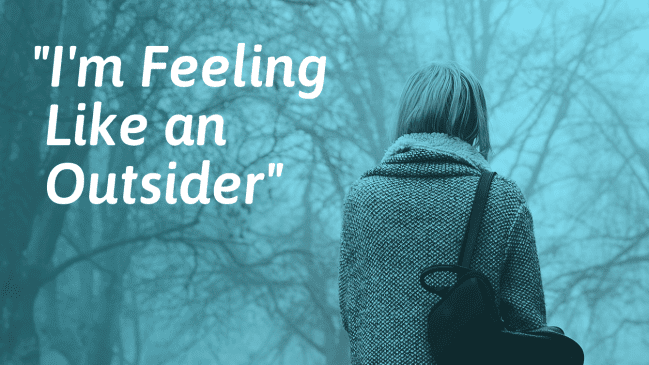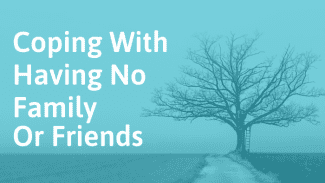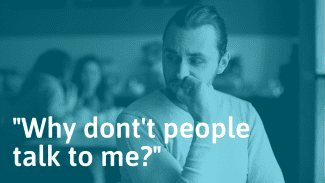“I feel like I’m always outside looking in, like no-one understands me or cares. I always get the sense that I’m on the B team”
Feeling like an outsider can be really painful. Whether it’s within our own families, our friendship groups, or at work, most of us want to feel like we belong.
Being part of the group was an essential survival mechanism.[1] As social beings, we need that sense of community to feel safe. Feeling like an outcast even activates the same areas of the brain as physical pain.[2]
In this article, we’re going to look at why you might feel like an outsider, and what you can do about it.
1. Remember that others feel like outsiders too
Feeling like an outsider is something most of us will go through at some point in our lives.[3]
Try to think of times in the past where you started out feeling like an outsider and went on to be accepted and included within a group. This can make it easier for you to believe that you can be accepted this time as well.
When you feel like an outsider, it can be easy to assume that everyone else feels like an integral part of their groups. If you can, try starting conversations about how others feel like outsiders. You could say something like:
“I was reading recently that loads of famous people felt like outsiders, even ones you wouldn’t expect. The list I saw had Albert Einstein, Rihanna, and Leonardo DiCaprio. What do you think? Do you think everyone feels like that at some point? Or is this part of why they were so motivated?”
This opens the conversation for people to talk about their personal experiences without you having to make yourself feel too vulnerable.
2. Get to know a specific person in the group
Feeling connected with a group can be a big task. Try to break it down by forming closer one-to-one relationships with the people around you. This technique can work equally well at work, with friends, or within your family.
Choose your favorite 3 (or so) people from your group and make a concerted effort to get to know them better. Invite them to events where it’s just the two of you, for example for a chat over lunch or coffee.
Focus on trying to be closer friends with those 3 people. Follow our guide for becoming close friends. It’s really important that you open up and let them see the ‘real’ you.
Once you feel secure that these people know and accept you, you might already feel less of an outcast in the group as a whole. If not, choose more people and really focus on getting to know them as well.
Knowing everyone in the group as an individual can make it easier to feel accepted and included.
3. Devote 10 minutes per day to practice social skills
If you struggle to form close friendships in a one-to-one situation as well as in a group, you might want to work on your social skills. Spending a little bit of time improving your ability to make small talk, form friendships, and overcome awkwardness can help you to feel confident that others will like and accept you.
Try to devote at least 10 minutes per day to learning more about social skills, and 10 minutes per day practicing using those skills. Consider creating a reading list of articles that might help you and setting yourself daily targets. For example, you might aim to smile at your barista and say hi to a neighbor each day for a week.
4. Organize social events
If your feelings of being isolated come from feeling that you’re always the last to be invited to events, try to arrange some of them yourself. In organized groups, such as sports clubs, you could offer to help the social secretary by arranging nights out or fundraising events.
For less formal groups, try to think of events that others might also enjoy. Talk with people one-to-one to find out the kinds of things that they would like to do. If you’re anxious about others not coming to your events, try to arrange something for just two or three of you and then (with their permission) open it up to the whole group.
5. Respect others’ values and expect the same in return
We can easily feel like outsiders when we have different beliefs and values from the people around us. This is especially difficult when dealing with close family.
You might be tempted to try to hide your different beliefs to make it easier for you to fit in. This can work for a little while, but you are more likely to end up feeling like even more of an outsider. You can end up thinking “they only like me because they don’t know the real me”.
Holding different values doesn’t mean that you can’t feel included. The important thing is that everyone needs to treat each other’s beliefs with respect. Make it clear that you respect their values and that you expect the same in return.
The next time you feel that your values make you feel like an outsider, try saying
“I know we disagree about that, but I think we can all agree that…”
For example, if I’m with my family, I might say
“I know we disagree about the details of politics but I think we can all agree that politicians need to work together to achieve the best for everyone”
6. Try to solve issues that isolate you
Some problems, such as a language barrier or not being familiar with the culture, can lead you to feel isolated and alone. If this is a factor in your feelings of isolation, consider ways to solve that problem directly.
Many language classes also offer guidance on cultural norms. They can also give you a sense of belonging within the class, as others are likely to be experiencing the same difficulties that you are.
Other practical problems include living too far away from your social group or not having much money for socializing. We have advice on how to have more close friends, including overcoming lots of these issues.
If in doubt, talk to your social group about these problems. If you’re not sure how to bring it up, try something like
“I’d really like to spend more time with you guys but I know me living so far away makes it difficult. Do you guys have any ideas?”
“I really can’t afford to go out for dinner this week. Could we maybe play football in the park?”
“My knee injury’s playing up so I don’t think I can do a gym session this week. I could host a board games evening though?”
7. Know that it takes time to feel included
If you have felt like an outcast in the past, you can become very sensitive to feeling excluded now. There are some situations, such as starting a new job, where most people will feel a little bit like an outsider. If you find yourself feeling rejected very quickly when getting to know a new group, you might want to adjust your expectations.
It can often take a few months to feel that you are a full member of a group. Try to avoid negative self talk, such as
“They’ll never like me anyway. I don’t know why I’m even bothering”
Instead, try saying
“I know this is taking longer than I would like, but making new friends is worth the effort”
8. Change the way you talk to yourself
Feeling like an outsider can come from not having the confidence to trust that other people want you around. Improving your self-esteem and confidence can be a long-term task, but every step gets you closer to your goal.
It can be really tough to improve your self-confidence whilst feeling like an outsider. The feelings of isolation can often become something you berate yourself with during negative self-talk.
Pay attention to the things you say to yourself. Try not to get frustrated or angry when you notice that you’ve slipped into negative self-talk. Try to correct yourself and move on. For example, if you say to yourself
“No-one wants me around. I’m worthless”
Try to stop, and say to yourself
“I know it feels like that, and it hurts. It’s not true, though. I’m a kind and caring friend and people do want me around. I’m just learning to believe it”
Use specific counterexamples if you can, such as “Anna called me just yesterday to chat”.
We have lots of other suggestions for improving your self-confidence. It can be a slow process, but it is worth it.
9. Stop seeking acceptance of others
Trying too hard to fit in can make you seem clingy and inauthentic. Ironically, being okay with not being included can make people include you faster. Because you’re not coming off as needy, you become more attractive for others to want to be around.
Say that if you’re talking with a bunch of friends and you feel like you can’t get a word in. Rather than trying to be noticed more aggressively, be okay with not being part of the conversation for a while. If you want to add to the conversation, do so because you think it will be a valuable addition, rather than in an attempt to be seen.
While you want to be okay with not being accepted or part of the group at all times, it’s as important as ever to be friendly, to take initiatives, and to accept invitations.
10. Be accepting of other’s differences
Ideally, you want to highlight the things that you have in common whilst being relaxed about ways in which you are different.
People will usually react much better to differences if you treat them as inconsequential. If you seem embarrassed or uncomfortable about your preferences, or judgmental about theirs, they will probably see it as a bigger deal. For example, if someone is talking about music they like, I probably won’t know most of the songs (unless they share my particular niche). Years ago, I tended to annoy people, by placing an implicit judgment on their tastes
“I don’t know them. I hate all chart music.”
Now, I’m careful to acknowledge the difference (because I don’t want to get stuck listening to music I dislike) without passing judgment.
“I actually don’t know them but I have kinda niche music tastes.”
11. Seek help with anxiety or depression
Anxiety and depression can both lead you to feel excluded from social groups, no matter how much others tell you they want you around.
If you think that you may be depressed or suffering from social anxiety, talk to your doctor. Both medication and therapy have been found to be helpful in overcoming feelings of social withdrawal and isolation that come from anxiety or depression.[4]
We recommend BetterHelp for online therapy, since they offer unlimited messaging and a weekly session, and are cheaper than going to a therapist's office.
Their plans start at $64 per week. If you use this link, you get 20% off your first month at BetterHelp + a $50 coupon valid for any SocialSelf course: Click here to learn more about BetterHelp.
(To receive your $50 SocialSelf coupon, sign up with our link. Then, email BetterHelp’s order confirmation to us to receive your personal code. You can use this code for any of our courses.)
You can also try other ways to help yourself. Try to take at least 10 minutes per day for something that makes you feel happier, such as a walk in the woods or a hot bath. Working on your diet, sleep and exercise can all help to reduce the symptoms of depression and anxiety.
12. Avoid toxic people
Sometimes you can feel like an outsider because someone else is trying to make you feel that way. It could be that your group has one or two toxic people. Try not to make this your default assumption, but look out for some of the ‘red flags’. These include
- Constantly talking about events you weren’t invited to
- Body language that physically blocks you in group conversations
- Constantly highlighting things you missed out on
- Making a big deal about inviting others to events in front of you
If you notice these kinds of behaviors, consider talking to another member of the group to see whether they’ve noticed. If others in your group accept this kind of social exclusion, you might be better off finding a more accepting group.
13. List things that help you feel included
Understanding what feeling included would feel like to you can help you work out what is missing from your relationships. That can make it easier to fix those problems.
Common things that make people feel included might be
- Being invited to group events
- Feeling like others want you around
- Understanding the group jokes
- Having things in common
- Having people care about how you are feeling
- Feeling noticed
- Feeling understood
- Having others know your name
Make a list of things that would help you feel included. Looking at that list, see whether you can think of any ways to help with those specific problems. For example, if having others know your name is on your list, you can make an effort to introduce yourself to as many people as possible during group events.
14. Understand your attachment style
Our early experiences can affect how we feel about other people. This is known as your attachment style and might help you to understand why you feel like an outsider.
If you notice that there is a pattern to your feelings of being excluded, try reading up on attachment styles. For example, one attachment style might make it hard for you to open up to others, while another might lead you to feel particularly sensitive to criticism.
If you recognize yourself in some of these descriptions, you might benefit from talking to an experienced therapist to help you resolve underlying difficulties.
We recommend BetterHelp for online therapy, since they offer unlimited messaging and a weekly session, and are cheaper than going to a therapist's office.
Their plans start at $64 per week. If you use this link, you get 20% off your first month at BetterHelp + a $50 coupon valid for any SocialSelf course: Click here to learn more about BetterHelp.
(To receive your $50 SocialSelf coupon, sign up with our link. Then, email BetterHelp’s order confirmation to us to receive your personal code. You can use this code for any of our courses.)
Try to think of someone you have a ‘secure’ attachment to. This is someone that you trust to be there for you when you need them. Studies show that thinking about this person when you feel socially isolated can make you feel better.[5]
15. Check whether you’re misreading the situation
Feeling like an outsider doesn’t mean others see you that way. You might not realize how much other people value having you around until you ask.
Rather than assuming that others see you as an outsider, try to find out. Consider asking a member of the group that you trust. If being direct is too difficult, you can ask indirectly. You could say
“I’ve been feeling a bit isolated and distant from people lately. Have you noticed any difference?”
This can open up a conversation for you to talk about how you’re feeling and get a better understanding of how others see you.
16. Find positives in being an outsider
Although being an outsider can be painful, there are some aspects of it that you might find rewarding. Social outsiders are often more observant and are able to move between different social groups easily.
Outsiders tend to be more creative and are less likely to feel a strong need to conform. At work, you might notice problems that everyone else missed. Remember that being an outsider in a group setting doesn’t stop you from having deep, meaningful connections with other people in a one-to-one setting.
If you find that you are comfortable being an outsider, be confident in your decision and remind yourself of the benefits for you. If it still makes you unhappy, though, you now have lots of tools to help you feel more included.






I’ve always been an outsider wherever I go and have never felt like I belong. I’ve never had a ‘group’ to be part of and not once in my life has anyone tried to be my friend. When I’ve tried to reach out to others to try to begin friendships, I’ve always been treated with indifference. I’ve never been bullied or anything like that but I’ve never experienced friendship or the feeling that anyone is interested in getting to know me. I am and always (since childhood) invisible. And of course I’ve never had any sort of intimate relationship – those things are clearly out of bounds for me.
Loved this article, i always feel like having a barrier (fear) when trying to talk to somebody and its like directing me to do anything else but to socialize and in those moments its like my brain is telling me i can always do this another time or now is not the time because i should do something else right now.
I know the feeling Sebastian and my brain is fooling me to do exactly the same thing as yours. Avoid interaction. I hope that I in the future can learn to go with my wish instead of my fear:)